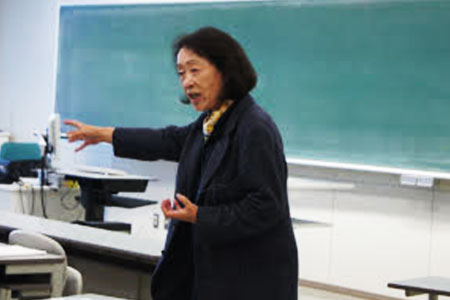On November 7, 2014, former Vice President of the World Bank NISHIMIZU Mieko gave a special lecture entitled “What’s in a name? From the grassroots to the corridors of power”. Dr. NISHIMIZU talked about the World Bank, the effects of corruption and what we can do to reduce poverty.
After teaching at Princeton University, Dr. NISHIMIZU joined the World Bank where she worked her way up to Vice President. Dr. NISHIMIZU has been actively writing and giving lectures worldwide even after retiring from the World Bank.
Dr. NISHIMIZU began by saying that the World Bank is not an aid agency but a financial institution that issues bonds, whose ratings and trustworthiness are of the highest level, and loans to developing and middle-income countries. Most of the world’s countries are members of the Bank, which means their citizens are the owners of the Bank.
Though Dr. NISHIMIZU joined the World Bank to fight against poverty, the Bank at that time was bureaucratic and far from achieving the ideal of a world without poverty. She was determined to change that, but there was opposition to change. The governments of developing countries, which only represent the voice of the rich, and World Bank staff members, many of whom know very little about their customers, i.e., the citizens of poor nations, objected to lending an ear to the voice of the poor, who also happened to constitute the majority.
In order to know more about the poor, Dr. NISHIMIZU stayed with host families in India’s Kashmir region and other places for several weeks. The local people there had to fetch water several times a day, a trip that took one hour one-way along mountain paths, and sometimes had nothing to eat for a whole day. Dr. NISHIMIZU’s host mother told her, “This is not a life; we are barely keeping our bodies alive. I want to gain knowledge. If we had water at home, we could save a lot of time and energy.” Dr. NISHIMIZU realized these wishes had been overlooked by the government and the World Bank for a long time.
Dr. NISHIMIZU emphasized the importance of understanding the reality of the poor, finding out what is needed and then taking action.
Dr. NISHIMIZU concluded with a message for the students: “It is up to you, those who have received higher education, to changing government. No matter where you may be, be sure to exercise your power as an individual.”










